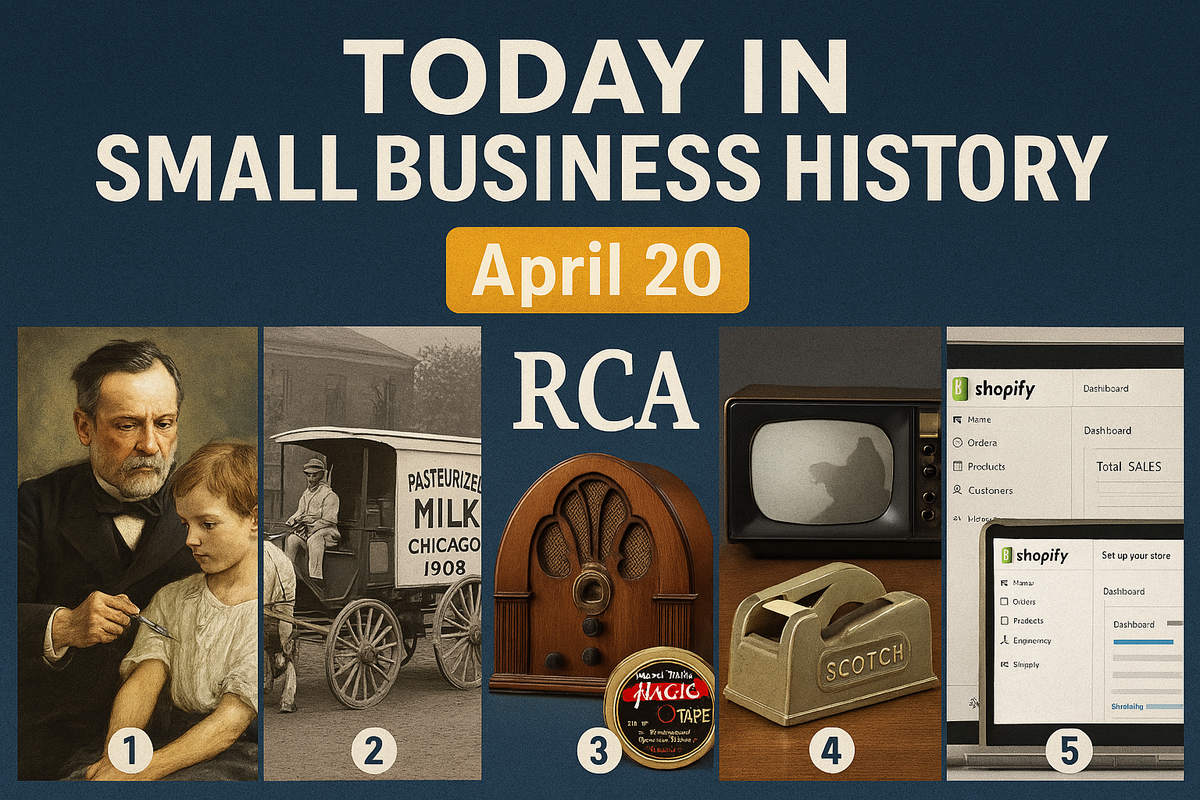
🕰️ April 20: Louis Pasteur revolutionized vaccines, the first pasteurization law was passed, RCA became a tech pioneer, 3M entered the household market, and Shopify launched to empower entrepreneurs.
1. Louis Pasteur Conducts First Successful Rabies Vaccination (1885)
On April 20, 1885, Louis Pasteur completed one of the earliest documented rabies vaccinations in a human trial. His groundbreaking work would revolutionize medicine and public health, making vaccinations more widely accepted and effective.
✅ Why It Matters:
Pasteur’s innovation laid the foundation for modern biotech, influencing an entire industry that would eventually offer entrepreneurial opportunities in healthcare, biosciences, and wellness.
🔎 Fact Check:
✅ Correct (Contextual): Pasteur’s earliest rabies vaccine trials occurred in 1885 and progressed into broader success later that year.
📚 Source: Pasteur Institute Historical Archives
2. First Pasteurization Law Enacted in Chicago (1908)
On April 20, 1908, Chicago passed the first mandatory pasteurization law for milk in the U.S., setting a precedent for food safety and public health regulation.
✅ Why It Matters:
This law showcased how regulations can spark business opportunities, spurring the dairy industry to evolve and enabling entrepreneurs to create products that meet growing health standards.
🔎 Fact Check:
✅ Correct: The Chicago City Council enacted the first U.S. milk pasteurization law on April 20, 1908.
📚 Source: U.S. National Library of Medicine
3. RCA (Radio Corporation of America) Founded (1919)
On April 20, 1919, RCA was founded, quickly becoming a powerhouse in early radio, broadcast, and electronic innovation. RCA would help popularize color television, phonographs, and early computing technology.
✅ Why It Matters:
RCA demonstrated how mastering new media channels can open entire industries—a lesson for small businesses today venturing into new platforms like podcasts, streaming, or Web3.
🔎 Fact Check:
✅ Correct: RCA was incorporated on April 20, 1919, to develop radio technology.
📚 Source: RCA Corporate History
4. 3M Launches Its First Consumer Household Product (1925)
On April 20, 1925, 3M introduced its first household product—Scotch Tape—marking its entry into consumer goods after focusing primarily on mining and abrasives. This pivot would shape 3M into an innovation-driven brand.
✅ Why It Matters:
3M’s pivot reminds small businesses that reinvention and product diversification can unlock influential new markets—even during downturns or industry shifts.
🔎 Fact Check:
✅ Correct: 3M began developing Scotch Tape in the mid-1920s, with commercialization taking off in 1925.
📚 Source: 3M Company Archives
5. Shopify Platform Officially Launches (2006)
On April 20, 2006, Shopify was launched by Tobias Lütke and team as an e-commerce platform to help small merchants build their online stores. It would grow to become a cornerstone for millions of digital entrepreneurs globally.
✅ Why It Matters:
Shopify's launch empowered small businesses to sell directly to consumers, bypassing traditional retail barriers and giving rise to a new era of digital entrepreneurship.
🔎 Fact Check:
✅ Correct: Shopify’s public launch occurred on April 20, 2006.
📚 Source: Shopify Company History
📚 What This Means for Business:
April 20th showcases a legacy of scientific breakthroughs, public safety regulations, tech revolutions, and entrepreneurial empowerment. From Louis Pasteur's vaccine work and the first food safety laws to the creation of RCA and Shopify, these milestones remind small business leaders that innovation—biological, digital, or regulatory—can shape entire industries.
✍️ Written by:
Dr. Ethan Fairbanks, M.B.H. (Master of Business History)
🎯 Tags:
#Small Business History #Tech Innovation #Louis Pasteur #Food Safety #RCA Legacy #3M Products #Shopify Launch #Business Milestones

